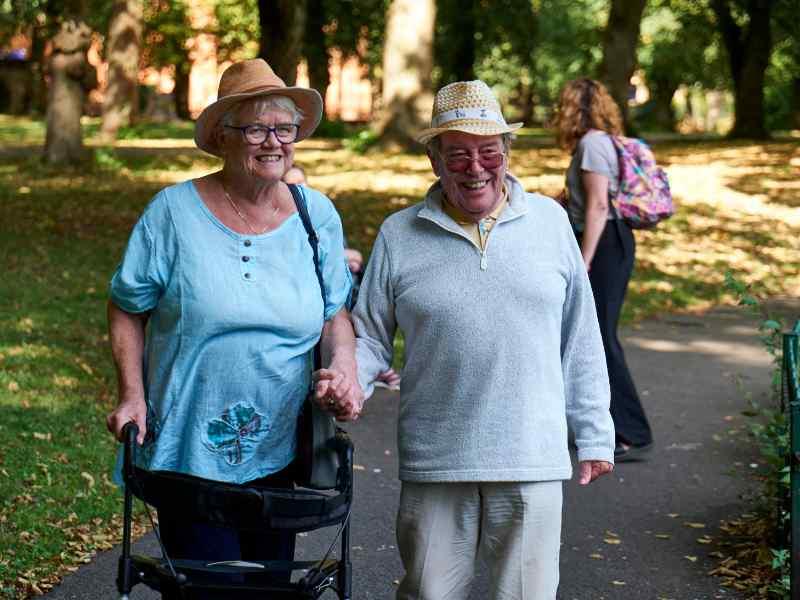Foreword
Welcome to this year’s Annual Report in which we summarise some of the NIHR’s key achievements and its expenditure from April 2022 to March 2023. With Dr Gail Marzetti joining DHSC in July 2022 as Director of the Science Research and Evidence directorate, this foreword is once again a co-authored piece.
Addressing health and care needs and priorities
Throughout the year, the NIHR sought research evidence to support delivery of the Government’s health and care objectives. For example, in January we funded rapid research projects using data-driven approaches to address easing winter pressures, and a month later launched a call for research to reduce compound pressures on the NHS and social care. We focused our research not only on major conditions such as cancer, cardiovascular disease, diabetes, dementia and mental ill health, but also on rarer conditions such as motor neurone disease and cystic fibrosis.
The economic return to society from investing in health research is high. For every £1 invested in NIHR research, society receives £19 of benefits, from direct health benefits, profits to UK firms and returns to the wider economy. From the NIHR’s 2022-23 spend of £1.3 billion there is an expected return of around £20 billion (discounted net present value) over the next 20 years.
Health research saves lives, reduces disability, makes the NHS more efficient and contributes to a range of Government priorities, such as levelling up across the country and making the UK a science superpower.

For every £1
invested in NIHR research, society receives £19 of benefits
Attracting investment from the life sciences industry
The NIHR has continued to build and maintain health, care and clinical research infrastructure and expertise in all regions of the UK. This investment is far-sighted and ensures that the UK has the relevant expertise, technology, and facilities to sustain the UK’s edge in life sciences in the long term.
During the 2022-23 financial year, DHSC announced a new 10-year partnership with Moderna and a memorandum of understanding with BioNtech. Both of these US-based companies are leaders in messenger RNA technology and are developing personalised immunotherapies for cancer and infectious disease vaccines. The NIHR will be instrumental in supporting the delivery of both Moderna’s and BioNTech’s clinical trials, ensuring UK patients are some of the first in the world to access their new treatments.
Continuing to invest in COVID-19
The UK led in pivoting clinical research towards COVID treatments and ran trials large enough to test treatments definitively at pace and scale. For example, the UK undertook the research that identified the first effective treatment to improve survival rates of those affected by COVID-19 (steroid dexamethasone) and developed the Oxford/AstraZeneca vaccine.
While the NIHR’s expenditure on COVID-19 has more than halved from the previous financial year, we maintain a significant commitment to research into vaccines, treatments and recovery from COVID-19, and are now extending work into tackling influenza. For example, we continued to invest in community-based research into new antiviral treatments, and funded research that determined how to optimise the antibody response of people on immune-suppressing medicines following a COVID-19 booster vaccination.
Long COVID remains an important area of research. For example, we funded an analysis of the relationship between vaccination and long COVID, and supported researchers to work with patients on a tool to assess the symptoms of long COVID and their impact. In May, the NIHR issued an evidence collection on long COVID research which shows the breadth of our work in this vital area.
Restoring a balanced portfolio of research
In order to pivot our research systems to tackle the COVID-19 pandemic, we initially had to pause much of the rest of the clinical research portfolio.
In March 2022, DHSC and NHS England initiated the Research Reset programme to build back a thriving and sustainable research portfolio. Study sponsors, funders and chief investigators were asked to critically review their studies on the national clinical research portfolio and take action on those studies considered ‘off track’. Our goal was to free up capacity across the research system, making delivery of the portfolio achievable within planned timeframes and sustainable within the resource and capability available in the NHS.
By the end of March 2023, we saw encouraging signs of improvement. For example, we were recruiting around 71,000 people to studies each month, up from 61,000 pre-pandemic, and had nearly 6,000 studies on the portfolio, nearly 500 more than in 2019. We look forward to providing evidence on further progress with improving the research pathway and ecosystem in the 2023-24 annual report.
Increasing our commitment to social care and public health
At the beginning of April 2022, the NIHR changed its name to the National Institute for Health and Care Research to signal its commitment to social care. Consistent with this, we expanded our Research for Social Care funding call to run twice per year, with an extended remit into children’s social care. In the 2023-2024 financial year, this will become a stand-alone programme.
The NIHR also entered into a partnership with the Engineering and Physical Sciences Research Council, jointly funding 14 new research projects to develop technologies that help people transform their care and health at home.

10
Health Determinants Research Collaborations
Public health also continues to be a key priority area. One of the most exciting and promising developments of the year was the establishment of 10 Health Determinants Research Collaborations in some of the most deprived areas of the country. The HDRCs are intended to boost local authorities’ capacity and capability to conduct high-quality research into the social, economic and environmental factors that can lead to health inequalities. We expect that the number of HDRCs will grow over time.
Harnessing the power of artificial intelligence
We are proud that the NIHR has been quick to recognise the potential of artificial intelligence.
We continued to invest in research that uses AI methods to better understand clusters of multiple long-term conditions, bringing our total investment in this area to date to £23 million. We also continued our investment in the AI in health and care award, providing funding to 9 new AI technologies to improve tests and treatments for patients.
86 AI technologies
invested in across 3 rounds of funding
Since the award was set up in 2019, £123 million has been invested in 86 AI technologies across 3 rounds of funding. One technology funded in an earlier round, CaRi-Heart, uses AI to predict cardiac risk in people with suspected coronary artery disease. It has already been trialled across 3 NHS sites and the National Institute for Health and Care Excellence (NICE) has recommended further research to support its wider use.
We have also made new investments in digital innovation. For example, we funded research into how home monitoring technology could help people with severe respiratory conditions, and into new digital approaches for the early detection and diagnosis of dementia.
Focusing on transparency and research inclusion
In August, we were delighted that the NIHR came first out of 21 European medical research funders in implementing best practices for clinical trial transparency as set out by the World Health Organisation.
Research inclusion also continues to be an area of priority. This year, the NIHR launched a new strategy founded upon 5 key themes. These themes are designed to foster a more inclusive environment, engage the talents and energy of diverse people across our work, and improve the relevance and quality of our funded research. We know that research inclusion of a representative population ensures greater impact when interventions become adopted.
The strategy was followed by publication of the NIHR’s second diversity data report. The data paints a similar picture to the previous year, illustrating that research is reflecting the diversity of the UK population and is becoming more inclusive, although we have more to do. In the future, to allow for richer analysis of our progress, the NIHR will report on a 3 year cycle with smaller summary reports provided annually.
Celebrating our colleagues
It was pleasing to see so many current and former NIHR leaders being honoured for their achievements in the Queen’s Jubilee Honours List and the New Year Honours List.
Honours included a damehood for Professor Lyn Chitty from the NIHR Great Ormond Street Hospital Biomedical Research Centre. CBEs were awarded to Professor Jill Manthorpe from the NIHR School for Social Care Research, Professor Janet Lord from the NIHR Surgical Reconstruction and Microbiology Research Centre, and Professor Chris Day from the NIHR Newcastle Biomedical Research Centre. A number of other leaders were awarded an OBE or MBE.
Closing words
In this report, we showcase some of the key work NIHR has undertaken to shape policy and practice and to maintain the UK’s strength in health and care research, including working with life sciences partners. There are many other examples. We have divided the report by the 6 core workstreams detailed in Best Research for Best Health: The Next Chapter.
It has been an exciting year and we look forward to making further progress in our mission to improve the health and wealth of the nation through research in 2023-24 and beyond.
You can find out more about our impact on the NIHR website and stay up to date with NIHR news through our social media channels and newsletters.

Professor Lucy Chappell, Chief Scientific Advisor, DHSC
Chief Executive of NIHR

Dr Gail Marzetti, Director of Science, Research and Evidence, DHSC
Deputy Chief Executive of NIHR
Funding high quality, timely research
...that benefits the NHS, public health and social care
Throughout the year, we have reinforced our commitment to funding research that leads to better outcomes for patients and the public or improves the health and social care system. Our work needs to be supporting some of the major pressures in the NHS at present, including tackling the patient backlog and addressing causes of excess mortality that have emerged since the pandemic.
In this chapter, we take a look at some of the most important stories from the past year.
Changes to NHS bowel screening could reduce patient backlog
Research funded by our Policy Research Programme found that the backlog of patients waiting for tests as part of the NHS bowel screening programme could be safely reduced. To achieve this, the researchers suggest increasing the blood level on the test that triggers an invitation for a colonoscopy (a scan of the bowel using a small camera). This could reduce the number of people waiting for a colonoscopy, without significantly affecting the number of cancers detected.

Review of continence, dementia and care that preserves dignity
Our research evidence collection showed that providing high-quality, personalised continence care for people living with dementia is essential to maintaining their dignity and improving their health. The review found people living with dementia at home, in care homes and in hospitals, often do not receive adequate continence care. One study found evidence of the routine use of incontinence pads during a hospital admission, regardless of whether patients were continent.
Virtual reality treatment for severe psychological problems
We funded the largest ever clinical trial of virtual reality (VR) therapy for mental health issues. The study, funded through our Invention for Innovation programme, showed that VR treatment works well for patients diagnosed with psychosis. The biggest benefits were experienced by those with the most challenging psychological problems.
Delaying prostate cancer treatment does not reduce survival rates
Findings from the long-running Protect trial showed men with localised prostate cancer who are actively monitored have the same high survival rates after 15 years as men who are treated with radiotherapy or surgery. Active monitoring involves regular tests to check on cancer. Men being monitored were more likely to see their prostate cancer grow or spread compared to those receiving radiotherapy or surgery, but this did not reduce their likelihood of survival. It is the longest-running study of its kind and 1,643 men took part. Our Health Technology Assessment Programme funded the trial.

Stem cell trial aims to revolutionise MS treatment
A world-first trial will test if stem cell transplantation could be used as a first-line treatment for patients with 'highly active' and ‘aggressive’ forms of multiple sclerosis (MS). We are funding the £2.3 million StarMS study through our Efficacy and Mechanism Evaluation Programme in partnership with the Medical Research Council. It is the first trial to compare the effectiveness and safety of autologous hematopoietic stem cell transplantation with 4 leading highly effective drug treatments.
Collaboration to tackle multiple long term conditions
In December, we announced funding for a new cross-NIHR collaboration to investigate multiple long-term conditions (MLTC). There are an estimated 14 million people in England alone living with MLTC and it is a significant challenge for the health and care service. The collaboration will be given £1.95 million to bring together the NIHR’s translational, applied and policy research infrastructure. This will make it easier for researchers and organisations from different specialties and centres to tackle MLTC research questions.
Investing in world-class expertise, facilities and a skilled delivery workforce
...to translate discoveries into improved treatments and services
Our diverse infrastructure - from Biomedical Research Centres to a 10,000 strong research delivery workforce - underpins publicly funded research as well as research funded by charities and the international life sciences industry. This infrastructure provides the stable and sustainable foundations that enable our science excellence to flourish, and that works to embed research across the NHS and wider health and care system.
In this chapter, we showcase some of its vital work.
Sustained participation in research, enabled by the Clinical Research Network
Data from our Clinical Research Network showed research participation remained at a high level following the COVID-19 pandemic. 1,289,937 people took part in more than 4,600 portfolio studies in England between April 2021 and March 2022. Across the same period, 100% of NHS trusts and 51% of GP practices recruited participants to take part in clinical research studies.

Diagnosing Alzheimer’s disease from a single brain scan
New research, supported by our Imperial Biomedical Research Centre, showed a single MRI scan of the brain could be enough to diagnose Alzheimer’s disease. Researchers developed an algorithm to analyse structural features shown on brain MRI scans, including in regions not previously associated with Alzheimer’s. This machine learning technology was able to accurately predict the existence of Alzheimer’s disease and identify the disease at an early stage, when it can be very difficult to diagnose.
Finding when people with COVID-19 are most infectious
We funded a study to determine how long people remain infectious after natural COVID-19 infection. The findings suggest that the majority of people who develop symptoms are not infectious before their symptoms develop. Two-thirds of these cases are still infectious 5 days after their symptoms begin. This work was undertaken in one of the NIHR’s Health Protection Research Units.
Giving people lab-grown red blood cells for the first time
We funded a world-first clinical trial that has started giving lab-grown red blood cells to healthy volunteers. If proved safe and effective, the technology could revolutionise treatments for people with rare blood types, blood disorders such as sickle cell, or people who are not able to have normal blood transfusions. This research was supported through one of our Blood and Transplant Research Units.

World-first treatment for 'incurable' T-cell leukaemia
A teenage girl's incurable cancer has been cleared from her body using genetically modified immune cells. It is the first time this form of the treatment has been used in a patient, thanks to research we supported through our Biomedical Research Centre at Great Ormond Street Hospital.
How NIHR ARCs rose to the challenge of COVID-19
In March 2023, on the third anniversary of the first UK lockdown, we looked back at the vital contribution of NIHR’s Applied Research Collaborations (ARCs) in the fight against COVID-19. We published a report highlighting the 400-plus projects the ARCs were involved in during the pandemic. Topics included predicting hospital bed occupancy for COVID patients, convening citizens’ juries on patient data sharing, point-of-care testing in care homes, and the impact of COVID on GP consultations.
Partnering with patients, service users, carers and communities
…improving the relevance, quality and impact of our research
Our public partnerships ensure that the needs of people and communities remain at the forefront of all aspects of our work. They play a critical role in shaping our research and volunteering to participate in studies and trials. This chapter highlights examples of those partnerships in action.
Guidance for easier payment of public contributors to research
We launched new guidance about paying members of the public involved in research. Slow payments and complicated procedures are barriers to inclusive and accessible public involvement. The guidance aims to help organisations and researchers to provide timely and suitable payments to public contributors. We developed the guidance in partnership with Health and Care Research Wales and the Health Research Authority.
Volunteers feel valued by researchers
Our Participant in Research Experience Survey showed that 92% of adults and 95% of young people felt their contribution to studies was valued by researchers and study teams. Those surveyed praised research teams for their kindness, friendliness and knowledge, despite ongoing pressures on the NHS. 25,459 participants completed the adult survey and 252 participants completed the children and young people’s survey. The results enable us to continue improving the national delivery of research.

Improving awareness and inclusion in research
We extended a scheme to improve inclusion and representation in research. The Research Ready Communities programme was successfully piloted in Blackpool, Doncaster and Brixton where researchers worked to engage under-served communities. The programme involves training local 'community champions' to understand more about perceptions and awareness of research in different community groups.

Be Part of Research now available through the NHS App
As of February 2023, Be Part of Research is available through the NHS App in England. Be Part of Research is our online service for people to find and take part in health and care research. By featuring on the NHS App, we can make it easier for people to search for suitable research opportunities and register their interest.
New framework to support racial equality in public involvement
In April, we published our Race Equality Framework to help organisations improve racial equality in public involvement in research. The framework is a self-assessment tool to analyse how to change policies, practices and culture to better serve diverse communities, improve race relations and ultimately improve healthcare delivery. We co-produced the framework with members of our Race Equality Public Action Group.

Working with pregnant women to aid childbirth choices
We funded a new study which will help pregnant women make an informed choice between vaginal or caesarean birth. Researchers will survey pregnant women, parents and healthcare staff in order to develop a 'decision aid' that will then be tested in 5 UK maternity units.
Attracting, training and supporting the best researchers
… to tackle complex health and social care challenges
As the nation’s largest funder of health and social care research training, we continue to invest in the talents of people who want careers in research or want research in their careers. We know that careers in research can be a crucial part of attracting and retaining health and care professionals in the workforce, reaching those who contribute through research delivery and management, as well as those taking a more academic research leadership route.
This chapter features news stories showing our different approaches to developing research capacity and capabilities on a multidisciplinary basis across the health and care system.
1,000 health and care staff take their first step in research
More than 1,000 health and care professionals have experienced research for the first time, through our Associate Principal Investigator Scheme. This is a key milestone for the scheme, which began in the West Midlands in 2018 and is now nationwide. People on the scheme experience what it means to work on and deliver research, under the guidance of a local experienced Principal Investigator. The scheme aims to equip health and care staff with the skills to become future Principal Investigators themselves, contributing to research across many areas.

New funding to support next generation of dementia researchers
In July, we introduced £11.8 million of funding for dementia research. £7.5 million of the funding will be spread across the 15 NIHR Applied Research Collaborations to support career development awards for early career dementia researchers. £4.3 million of funding is being injected into supporting researchers in dementia via the NIHR Schools for Primary Care Research, Public Health Research and Social Care Research. The funding is provided in partnership with the Alzheimer’s Society.
New Senior Research Leader Programme for nurses and midwives
We launched a new programme to help senior nurses and midwives become research leaders. The 3-year programme will enable nurses and midwives to increase their research capacity and capability. The programme will run on an annual basis, with 15 nurses and midwives recruited to it every year.

Artificial intelligence e-learning launched for researchers
Our Clinical Research Network developed a new e-learning course to build artificial intelligence (AI) knowledge and awareness. The self-paced course is for researchers including research nurses, research managers and clinicians. It covers topics such as how AI methods can be used in the healthcare sector, key AI concepts and an introduction to evaluating AI performance. More than 200 users have taken the course.
Career development awards for research leaders
In February, we announced the latest researchers to become NIHR research professors. The Research Professorships Scheme funds researchers to promote their effective translation of research. It also aims to strengthen research leadership at the highest academic levels. This year, 6 leading researchers will receive 5-year awards of up to £2 million each.

New campaign to help develop careers in research
In October, we ran a new campaign to encourage more people to add research to their career. The first phase of the Your Path in Research campaign focused on encouraging people working in social care and public health to integrate research into their roles. The campaign included a matchmaking service to connect practitioners with researchers in the field and an interactive game.
Collaborating with other public funders, charities and industry
…to shape a cohesive and globally competitive research system
We work with partners to create a UK research system that meets the needs of the public, is at the forefront of research internationally and attracts inward investment. In this chapter we explore stories of how we are collaborating with research partners across a variety of areas.
Driving improved clinical research delivery
The Future of UK Clinical Research Delivery: 2022 to 2025 implementation plan was published in June. The plan sets out the steps the government will take to achieve its vision for the future of clinical research delivery. Working with partners across the UK, the NIHR has made progress on our commitments in the plan, including:
- enhancing the Be Part of Research website to improve the patient and public experience
- decentralising trial design and delivery models to reduce the need for people to travel to a specific location to take part in a study
- conducting studies online and in the community
- publishing our Race Equality Framework
- launching a new UK-wide professional accreditation scheme for Clinical Research Practitioners
- launching the NIHR Associate Principal Investigator Scheme which helps health and care professionals to become PIs of the future
Partnering with industry on a world first
We collaborated with global pharmaceutical company Sanofi to begin a ground-breaking new study into the leading cause of infant hospitalisation. The HARMONIE study will investigate respiratory syncytial virus (RSV) which affects 90% of children before the age of 2. RSV often causes only mild illness but can lead to more severe lung problems such as bronchiolitis and pneumonia. The NIHR is delivering this study across more than 100 sites including GP practices, with the first global participant recruited in Nottingham. In total more than 20,000 infants across the UK, France and Germany will take part in the study.

Collaborating to boost early phase cancer research
In January, we announced a contribution of £21.6 million to the network of Experimental Cancer Medicine Centres, part of £47.5 million of funding over the next 5 years. This will support clinical trials at 17 adult and 12 children’s ECMCs. The network is jointly funded with Cancer Research UK, the Little Princess Trust and the devolved administrations.
Partnering with charities for world’s largest genetic study of ME
We invited people diagnosed with myalgic encephalomyelitis (ME) to take part in the world’s largest genetic study of the disease. The DecodeME study hopes to reveal the tiny differences in a person’s DNA that can increase their risk of developing ME, sometimes known as chronic fatigue syndrome. DecodeME will analyse DNA in the saliva of 20,000 donated samples to explore whether the disease is partly genetic. The study is a co-production involving the University of Edinburgh, the charity Action for M.E, the Forward ME alliance of UK charities and people with lived experience of ME.

Joint statement for research to be a core part of clinical care
In October, we published a joint statement with the Royal College of Physicians about how to make clinical research part of everyday practice for all healthcare professionals. Our statement, Making Research Everybody’s Business, highlights the potential benefits this could have for tackling backlogs and reducing pressures on the NHS.
Working with the MRC to accelerate motor neurone disease research
We will play a key role in speeding up motor neurone disease (MND) research in the UK. Last year, the government committed £50 million to MND research over the next 5 years. £29.5 million of this is being accelerated into specialist research centres and partnerships with leading researchers. We will work with the Medical Research Council to manage the funding and ensure researcher's proposals are referred to the most appropriate scheme for consideration from the outset. This will help patients benefit from cutting-edge treatment and medicines sooner.
Funding applied global health research and training
…to meet the needs of the poorest people in low and middle income countries
Through Official Development Assistance, we fund applied research and training to benefit the poorest people in more than 50 low and middle income countries. This final chapter illustrates what we are doing to build R&D capacity and capability and the results of some of our funding. Our programmes fund work mainly in Africa, Asia and Latin America, however much of the new knowledge generated has wider implications for health systems worldwide.
Global health experts pave the way for safer surgery
One of our global health studies found that changing gloves and instruments before closing wounds, could reduce infections and provide safer surgery for thousands of patients around the world. The research, led by surgical care experts, found as many as 1 in 8 infections could be prevented by routinely switching gloves and instruments during abdominal wound closures. This could make a huge impact in low and middle income countries where patients are disproportionately affected by wound infections.
Tracking global antimicrobial resistance with genomic sequencing
The rise in antimicrobial resistance threatens healthcare at all levels in every country. The NIHR Global Health Research Unit on Genomics and enabling data for Surveillance of Antimicrobial Resistance is advancing the uptake and dissemination of whole genome sequencing technology to more low and middle income countries. We have worked with researchers in Colombia, India, Nigeria and the Philippines to track and manage outbreaks of antimicrobial resistance, and also variants of COVID-19. This has helped control infection in those countries.
Preventing injury and improving trauma care
NIHR-funded research in Nepal has informed public health interventions to prevent death and injury caused by road traffic collisions and accidents. Researchers working with the NIHR Global Health Research Group on Nepal Injury Research have established the Nepal Injury Research Centre at Kathmandu Medical College to address the impact of injury around the country. Researchers are also working with partners to address these problems in other low and middle income countries.

Addressing the rise of diabetes and heart disease in South Asia
As rates of diabetes and heart disease rise among South Asian populations, NIHR-funded researchers are developing novel approaches to understand and prevent their key risk factors. One study linked cross-sectional health data with environment mapping surveys for people living in Bangladesh and Sri Lanka. Researchers found that a higher density of fast food outlets near an individual’s home led to an 8% increase in their chances of a type-2 diabetes diagnosis.
New Global Health Research Centres
In October, we announced 5 new Global Health Research Centres to address non-communicable diseases and strengthen research capacity across the world. Non-communicable diseases are those that cannot be transmitted between people, such as diabetes, cardiovascular disease and chronic respiratory diseases. Co-led by researchers from the UK and low and middle income countries, the centres will each receive around £10 million in funding over 5 years.

Funding for new Global Health Policy and Systems Research
In December, we awarded funding to 8 new researcher-led projects as part of our Global Health Policy and Systems Research programme. The programme funds research to improve access to appropriate and affordable health services in low and middle income countries. Researchers based in low and middle income countries lead 50% of the new awards, marking an important shift in the programme‘s funding approach.
NIHR in numbers 2022/23
| Area | Total |
|---|---|
| Number of active research funding programme awards (including global health research) 1 | 1,887 |
| Number of researchers with career development awards (including global health research) 2 | 4,274 |
| Total number of studies in England supported by the Clinical Research Network 3 | 6,318 |
| Number of commercial studies in England supported by the Clinical Research Network 4 | 1,757 |
| Total number of studies supported by NIHR infrastructure and research units | 18,280 |
| Number of participants taking part in NIHR-delivered, UK-wide studies | 1,003,285 |
| Number of low and middle income countries with an active global health research funding award 5 | 53 |
1 Figure relates to research programme funding only.
2 Includes all awards active in the reporting year regardless of whether the award includes research funding or not.
3 Figure excludes Devolved Administration-led studies with English sites supported by NIHR CRN.
4 The studies counted in these metrics are all led by NIHR (lead administration in England) and were open to recruitment during the financial year.
5 Based on the country of the downstream partner(s) on global health awards active in the financial year 2022/23 and the DAC list of Official Development Assistance (ODA) recipients at the time of reporting. Global health research programmes are funded as part of the government’s commitment to spend 0.7% of Gross National Income on ODA. The funds are pooled from various departments, including the Department of Health and Social Care.
NIHR financial summary 2022/23
NIHR’s total spend decreased by around 1% in 2022/23 from 2021/22, due to a reduction in spend on COVID-19 research. Exclusive of spend on COVID-19 research, NIHR spend increased in 2022/23 by c3.4% from 2021/22, enabling NIHR to make additional investments in research funding, research infrastructure and training and career development. NIHR continued to invest significantly in research into COVID-19, with £42m spent on a range of studies, many in partnership with UKRI.
NIHR Annual Report financial summary excluding Official Development Assistance
| Research funding | Spend (£m) |
|---|---|
| AI (including AI i4i and AI Multiple long term conditions call) | 12.82 |
| Efficacy and Mechanism Evaluation | 21.86 |
| Evidence Synthesis Programme | 15.31 |
| Health Protection Research Units | 10.65 |
| Health and Social Care Delivery Research | 35.65 |
| Health Technology Assessment - Pharmaceuticals and Gene Therapy | 36.96 |
| Health Technology Assessment - Other Therapeutic Interventions | 26.80 |
| Health Technology Assessment - Prevention, Screening, Diagnosis | 5.54 |
| Health Technology Assessment – Social Care | 0.92 |
| Health Technology Assessment – Surgery and Medical Devices | 22.18 |
| Invention for Innovation | 25.07 |
| NHS Blood and Transplant Units | 2.42 |
| NIHR Innovation Observatory | 1.79 |
| Policy Research Programme | 30.13 |
| Programme Grants for Applied Research | 40.60 |
| Public Health Research | 20.17 |
| Public Health Research - Health Determinants Research Collaborations | 4.39 |
| Research Capability Funding | 42.89 |
| Research for Patient Benefit | 20.79 |
| Research for Social Care | 2.38 |
| Schools: Primary Care, Public Health and Social Care Research | 16.13 |
| Other, including legacy programmes and management not attributed to specific programmes | 30.01 |
| COVID-19 | |
| COVID-19 studies (including those funded by the Vaccines Task Force and delivered through UKRI) | 41.62 |
| Contributions to UKRI research programmes | |
| ESRC Centre for Care | 1.50 |
| ESRC-NIHR Dementia Research Initiative | 1.73 |
| MRC-NIHR Tackling Multimorbidity at Scale Initiative | 2.72 |
| MRC-NIHR Methodology Research Programme | 1.00 |
| Other contributions to UKRI research programmes | 0.92 |
| Contributions to other research programmes | |
| NIHR contribution to CEPI (non-ODA) | 10.00 |
| UK Prevention Research Partnership | 2.72 |
| Contributions received for NIHR research programmes | |
| Contribution from MRC: Efficacy and Mechanism Evaluation | -10.48 |
| Contributions from the Devolved Administrations for access to NIHR Programmes (HTA, HSDR, PHR, EME) | -23.63 |
| Research funding total (£m) | 453.56 |
| Research delivery infrastructure | Spend (£m) |
|---|---|
| Clinical Research Facilities | 26.80 |
| Clinical Research Network | 347.24 |
| Patient Recruitment Centres | 2.54 |
| Research delivery infrastructure total | 376.58 |
| Other NIHR infrastructure | Spend (£m) |
| Applied Research Collaborations | 30.54 |
| Biomedical Research Centres | 198.14 |
| Clinical Trials Unit Support Funding | 3.18 |
| Excess treatment cost funding (part-funded by NHS England) | 9.88 |
| Experimental Cancer Medicine Centres | 2.72 |
| Medtech and In-vitro Diagnostics Cooperatives | 3.23 |
| Patient Safety Translational Research Centres | 4.06 |
| Research Design Service | 10.29 |
| Other (including management) | 10.27 |
| Other NIHR infrastructure total (£m) | 272.31 |
| Training and Career Development 7 | Spend (£m) |
|---|---|
| Academy Fellowships - Doctoral | 14.24 |
| Academy Fellowships - Local Authority | 1.09 |
| Academy Fellowships - Predoctoral | 4.68 |
| Academy Fellowships - Postdoctoral | 21.26 |
| Clinical Academic Research Partnerships (via UKRI) | 1.06 |
| Integrated Academic Training - Academic Clinical Fellows | 43.83 |
| Integrated Academic Training - Clinical Lectureships | 24.64 |
| Research Professorships | 9.20 |
| Senior Investigators | 3.71 |
| Senior Research Leader Programme for Nurses and Midwives | 0.02 |
| Other (including management) | 9.60 |
| Training and career development total (£m) | 133.33 |
| Digital and data | Spend (£m) |
|---|---|
| Information systems that enable research | 11.47 |
| Knowledge services and data | 1.86 |
| Digital and data total (£m) | 13.33 |
7 The Integrated Clinical Academic Programme, which is managed by NIHR, is not included as it was funded by Health Education England in 22/23.
Total NIHR spend excluding Official Development Assistance (£m): £1,249.11
NIHR Annual Report financial summary including Official Development Assistance
| Official Development Assistance (ODA) | Spend (£m) |
|---|---|
| European and Developing Countries Clinical Trials Partnership | 3.24 |
| Global Alliance for Chronic Disease (Medical Research Council Partnership) | 0.6 |
| Global Effort on COVID-19 (GECO) Health Research (Medical Research Council Partnership) | 0.8 |
| Global Maternal and Neonatal Health (Medical Research Council Partnership) | 1.08 |
| Joint Global Health Trials Initiative (Medical Research Council, Wellcome and FCDO Partnership) | 3.24 |
| NIHR Global Health Policy and Systems Research | 6.43 |
| NIHR Global Health Research Centres | 2.21 |
| NIHR Global Health Research Groups | 15.31 |
| NIHR Global Health Research Units | 10.13 |
| NIHR Global Research Professorships | 2.7 |
| NIHR Research and Innovation for Global Health Transformation | 13.34 |
| NIHR-Grand Challenges Canada Partnership on Global Mental Health | 2.66 |
| NIHR-Royal Society of Tropical Medicine and Hygiene Partnership on Early Career Grants Scheme | 0.93 |
| NIHR-Wellcome Partnership on Major Awards, International Fellowships and Research to Policy Uptake Initiative | 4.09 |
| Research for Adolescent Health in Low and Middle Income Countries (Medical Research Council Partnership) | 1.59 |
| Research for Health in Humanitarian Crisis (Elrha Partnership) | 0.15 |
| WHO Alliance for Health Policy and Systems Research Partnership on Responding to the Climate Crisis | 0.62 |
| World Bank's Global Road Safety Facility (World Bank Multi Donor Trust Fund) | 2.2 |
| Other | 0.25 |
| Total ODA | 71.57 |
Total NIHR spend including Official Development Assistance (£m): £1,320.68
Please note the figures in the financial summary are provisional and are unaudited.

